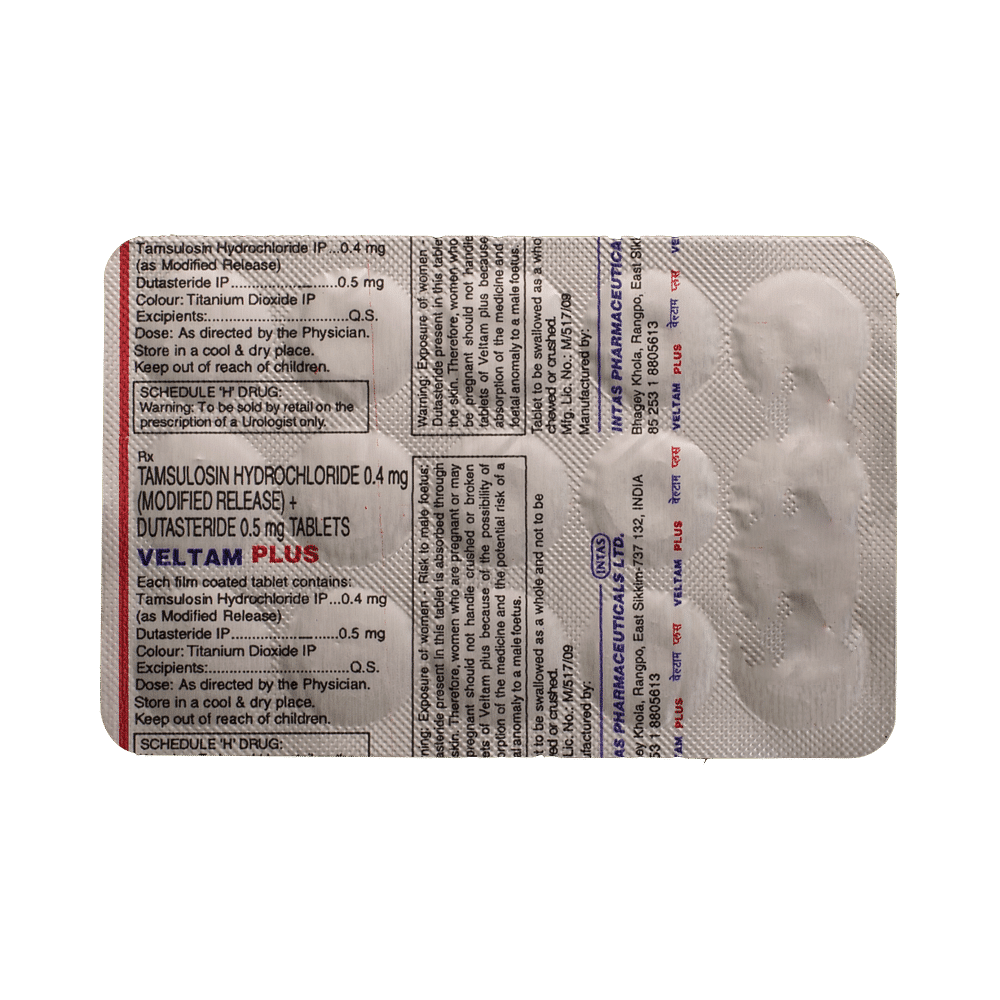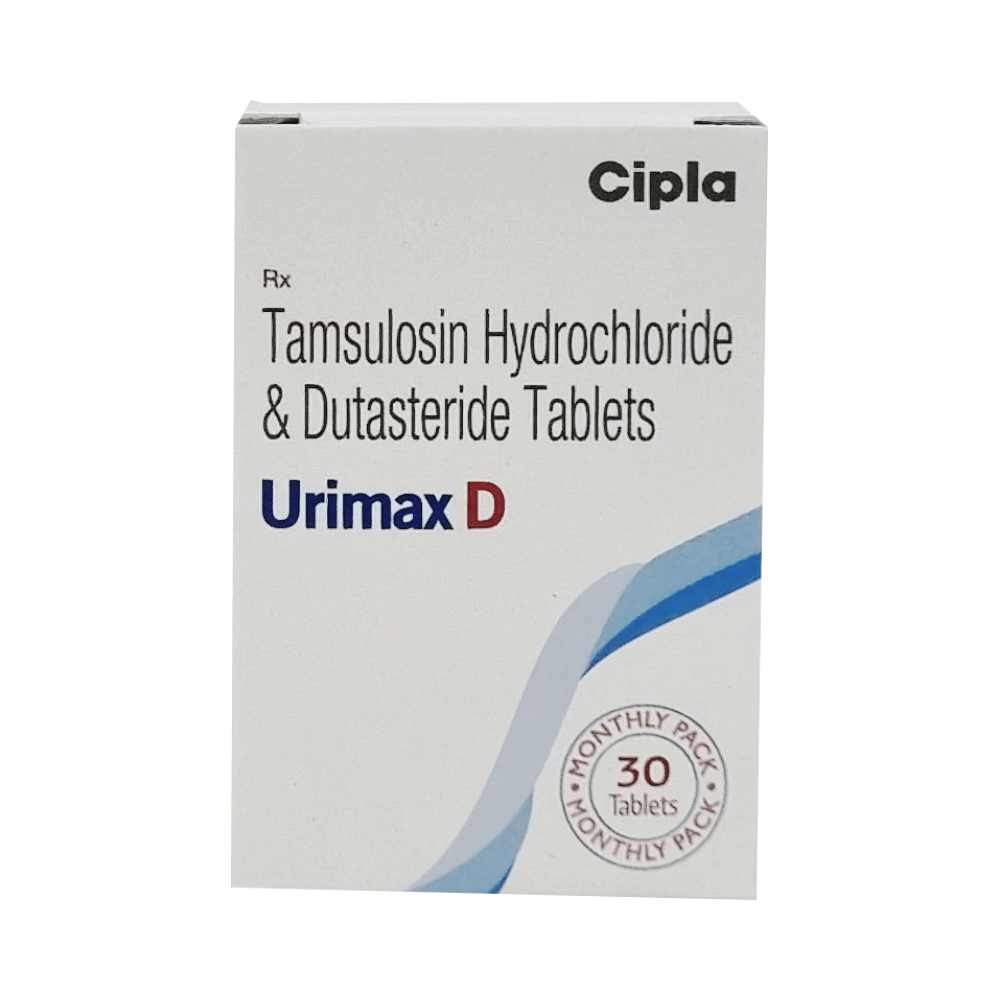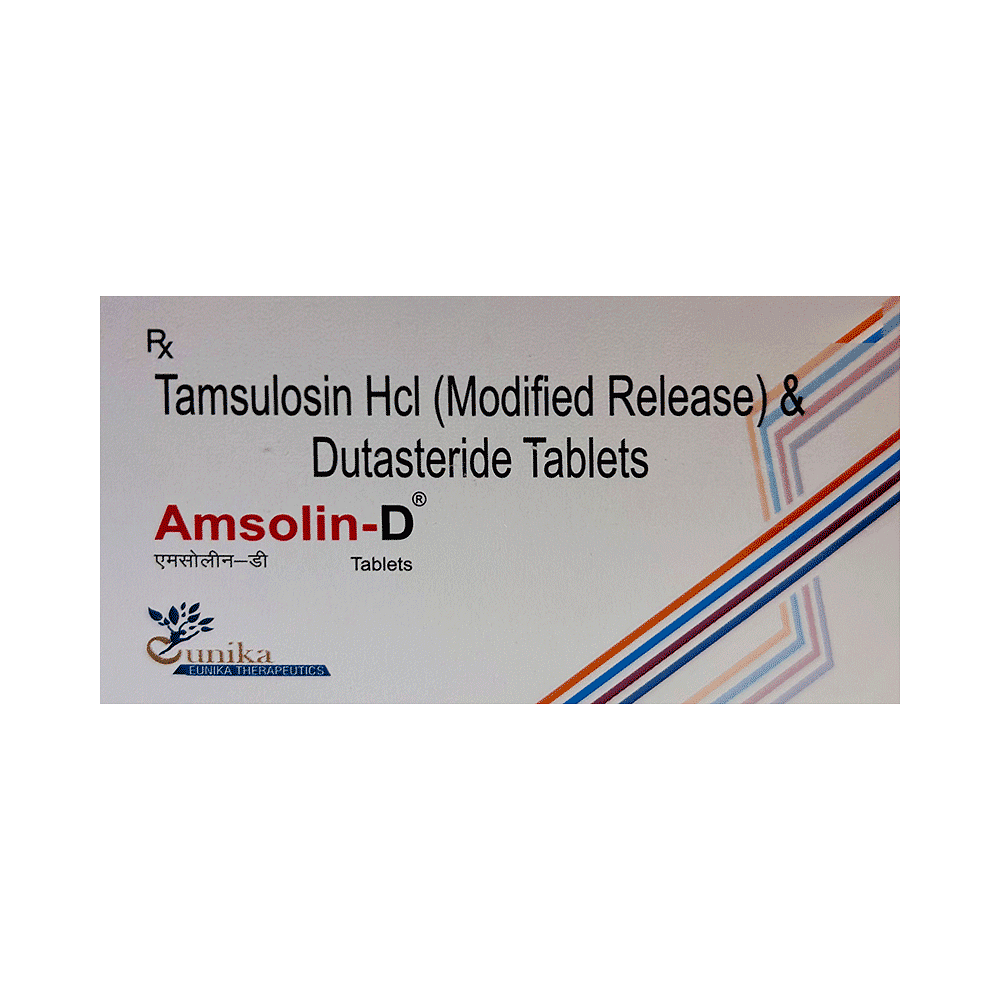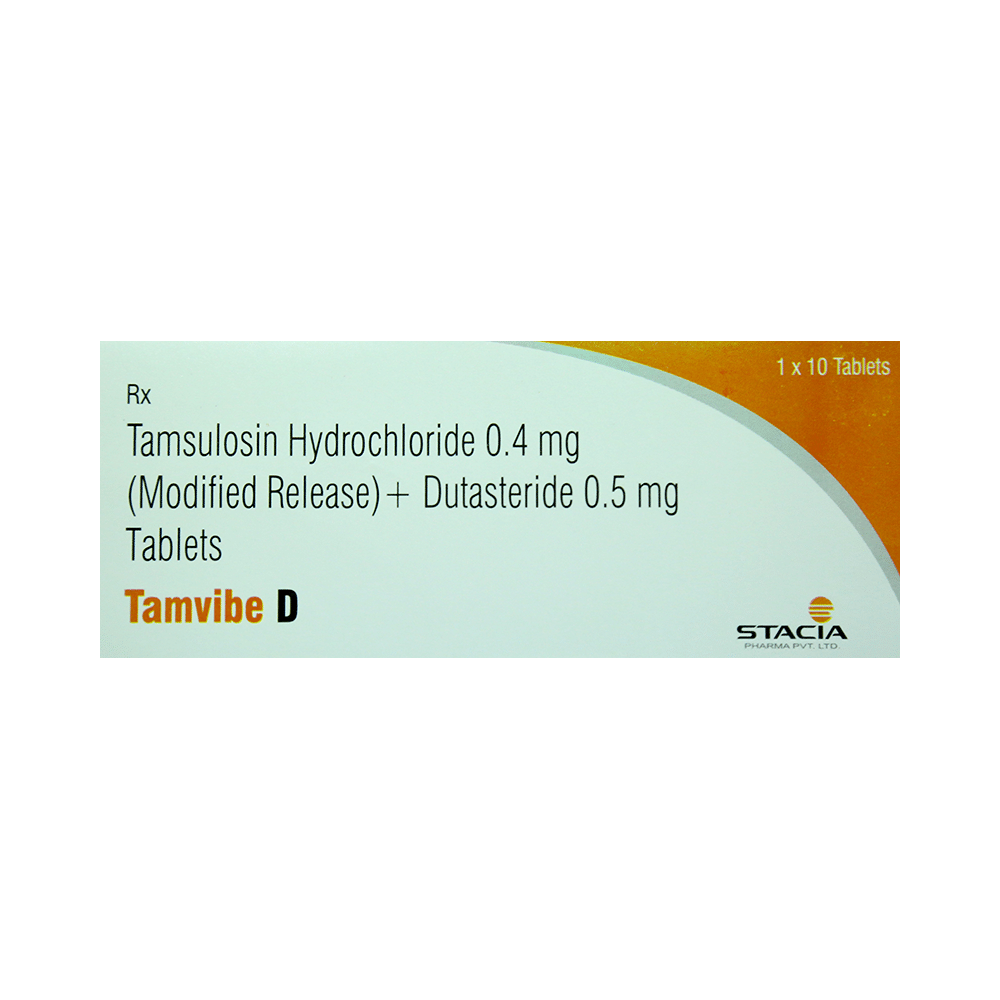
Contimax D 0.4mg/0.5mg Tablet MR
Manufacturer
Innovexia Life Sciences Pvt Ltd
Salt Composition
Tamsulosin (0.4mg) + Dutasteride (0.5mg)
Key Information
Short Description
Contimax D 0.4mg/0.5mg Tablet MR is a combination medicine used to treat symptoms of an enlarged prostate gland in men.
Dosage Form
Tablet MR
Introduction
Contimax D 0.4mg/0.5mg Tablet MR is a combination of Tamsulosin and Dutasteride, which work together to relieve symptoms of benign prostatic hyperplasia (BPH). It helps alleviate issues such as difficulty urinating or frequent urination. The medication is not intended to prevent prostate cancer. Common side effects include impotence, decreased libido, breast pain, and ejaculation disorders. It may also cause dizziness or drowsiness, especially when starting the treatment. This medicine should not be taken by women or children. Consult your doctor if you have low blood pressure, liver, or kidney disease, or if you are taking other medications.
Directions for Use
Take this medicine in the dose and duration as advised by your doctor. Swallow it whole without chewing, crushing, or breaking it. It may be taken with or without food, but it is better to take it at a fixed time each day.
Safety Information
Side Effects
Impotence Decreased libido Breast pain Ejaculation disorder
Alcohol Warning
Contimax D 0.4mg/0.5mg Tablet MR may cause excessive drowsiness with alcohol.
Breastfeeding Warning
Information regarding the use of Contimax D 0.4mg/0.5mg Tablet MR during breastfeeding is not available. Please consult your doctor.
Pregnancy Warning
Information regarding the use of Contimax D 0.4mg/0.5mg Tablet MR during pregnancy is not available. Please consult your doctor.
How it works
Contimax D 0.4mg/0.5mg Tablet MR combines Tamsulosin, an alpha-blocker that relaxes the muscles around the bladder exit and prostate gland, and Dutasteride, a 5-alpha-reductase inhibitor that shrinks the prostate gland by decreasing the hormone levels that cause its growth.
Quick Tips
You have been prescribed Contimax D 0.4mg/0.5mg Tablet MR to relieve the symptoms of benign prostatic hyperplasia (BPH). Take it approximately 30 minutes after the same meal each day. Contimax D 0.4mg/0.5mg Tablet MR may cause dizziness or blurring of vision. Do not drive or do anything requiring concentration until you know how it affects you. To lower the chance of feeling dizzy or passing out, rise slowly if you have been sitting or lying down. If you are scheduled to undergo eye surgery due to cataract or glaucoma, inform your eye doctor about the usage of Contimax D 0.4mg/0.5mg Tablet MR. It may cause difficulty achieving or maintaining an erection (impotence), decreased sex drive, and ejaculation disorders such as decreased amount of semen produced or decreased sperm count. Do not donate blood for 6 months after taking the last dose of Contimax D 0.4mg/0.5mg Tablet MR.
Related Medicines

Veltam Plus Tablet

Urimax D Tablet

Urimax D Tablet

Tamlu-D Tablet MR

Uricip D 0.4mg/0.5mg Tablet MR

Tamdosin D Tablet MR

Amsolin-D Tablet MR

Pross D 0.4mg/0.5mg Tablet MR

Tamvibe D Tablet MR

Urocrid-D Tablet MR
Frequently asked questions
Is Contimax D 0.4mg/0.5mg Tablet MR effective?
Contimax D 0.4mg/0.5mg Tablet MR is effective when used as directed by your doctor. It is essential to complete the full course of treatment, even if you experience improvement in your condition. Stopping the medication too early may lead to a recurrence or worsening of symptoms.
Can the use of Contimax D 0.4mg/0.5mg Tablet MR cause dizziness?
Yes, Contimax D 0.4mg/0.5mg Tablet MR may cause dizziness, lightheadedness, and fainting due to a sudden drop in blood pressure. If you experience these symptoms, avoid driving or operating heavy machinery. Rest for a while and resume your activities when you feel better.
What are the cautions associated with the use of Contimax D 0.4mg/0.5mg Tablet MR?
Contimax D 0.4mg/0.5mg Tablet MR is contraindicated in men under 18 years old, as it may affect the normal development of the male reproductive tract. It is also not recommended for patients with known allergies to its components, pregnant women, or women of childbearing potential. Pregnant women should avoid handling the medication, as it may be absorbed through the skin and harm the fetus.
Is Contimax D 0.4mg/0.5mg Tablet MR safe?
Contimax D 0.4mg/0.5mg Tablet MR is safe when used as directed by your doctor. It is crucial to take the medication exactly as prescribed and not skip any doses. Inform your doctor if you experience any side effects.
Can I take a higher than the recommended dose of this medicine?
No, Contimax D 0.4mg/0.5mg Tablet MR should only be taken in the recommended dose. Taking higher doses can increase the risk of side effects. Always follow your doctor's instructions and do not exceed the recommended dose.
What is the storage condition for Contimax D 0.4mg/0.5mg Tablet MR?
Store Contimax D 0.4mg/0.5mg Tablet MR in its original container, tightly closed. Dispose of any unused medication and ensure it is not consumed by pets, children, or other individuals.
Can the use of Contimax D 0.4mg/0.5mg Tablet MR cause ejaculation problems?
Yes, Contimax D 0.4mg/0.5mg Tablet MR may cause retrograde ejaculation or ejaculation failure. However, these effects are usually harmless and more common when the medication is taken in high doses.
Can the use of Contimax D 0.4mg/0.5mg Tablet MR cause priapism (persistent painful penile erection unrelated to sexual activity)?
Yes, Contimax D 0.4mg/0.5mg Tablet MR can cause priapism, a serious but rare side effect. If you experience this symptom, seek immediate medical attention to avoid permanent impotence.
Can the use of Contimax D 0.4mg/0.5mg Tablet MR have any impact on my cataract surgery?
Contimax D 0.4mg/0.5mg Tablet MR may cause floppy eye syndrome, which can affect cataract surgery. Inform your eye doctor if you are taking this medication or have used it in the last 9 months.
Apart from taking medicines, what should I do to manage my prostate symptoms?
Simple lifestyle changes can help manage prostate symptoms. Try to urinate when you first feel the urge, avoid straining or pushing while urinating, and limit fluid intake before bedtime or going out. Also, avoid medications that worsen urinary symptoms, such as some over-the-counter cold and cough medications.


